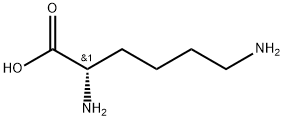
 CONTACT
CONTACT
- Linkman:Linda Yao
- Tel: +8618231198596
- Email:linda.yao@dcpharma.cn
- Linkman:CHARLES.WANG
- Department:Overseas
- Tel: 0086 0311-85537378 0086 0311-85539701
High purity ε-Polylysine Hydrochloride,Broad-spectrum Bacteriostasis
TIME:2024-07-18
ε-Polylysine hydrochloride is a homopolymer formed by lysine residues connected through amide bonds between the α-hydroxyl and ε-amino groups. Specifically, it is a high molecular compound consisting of 25 to 35 lysine monomers linked by specific chemical bonds. The molecule contains a large number of amino and carboxyl groups, which endow ε-polylysine hydrochloride with unique chemical properties.
Commonly seen ε-polylysine hydrochloride is typically a pale yellow powder, although it can also appear as a white crystalline powder, which may be related to production processes and purity levels. It is highly soluble in water, quickly forming a colorless solution with a solubility of at least 500 g/L. Additionally, it is slightly soluble in organic solvents such as ethanol. Due to its strong hygroscopicity, special care must be taken to prevent moisture absorption during storage and transportation.
Under acidic conditions (pH<7), ε-polylysine hydrochloride exhibits cationic properties, giving it good adhesion and adsorption capabilities. However, it demonstrates excellent stability under high temperatures, retaining its antibacterial activity even after being treated at 80°C for 60 minutes, 100°C for 30 minutes, or 120°C for 20 minutes.
ε-Polylysine hydrochloride possesses broad-spectrum antibacterial properties, effectively inhibiting the growth and reproduction of a variety of microorganisms, including Gram-positive and Gram-negative bacteria, yeasts, and molds. Its acute toxicity test LD50 is 5 g/kg, comparable to that of table salt, indicating extremely low toxicity. When ingested by the human body, it can be degraded into lysine nutrients and absorbed without any toxic side effects. Research shows that ε-polylysine hydrochloride also inhibits enzyme activity and fat absorption, helping to reduce the occurrence of obesity.
With its unique chemical structure and excellent physicochemical properties, ε-polylysine hydrochloride has found widespread applications in various fields such as food, daily chemicals, and medicine. Especially in the field of food safety, it plays an important role as an efficient preservative and antifungal agent.
- Tel:+8618231198596
- Whatsapp:18231198596
- Chat With Skype







